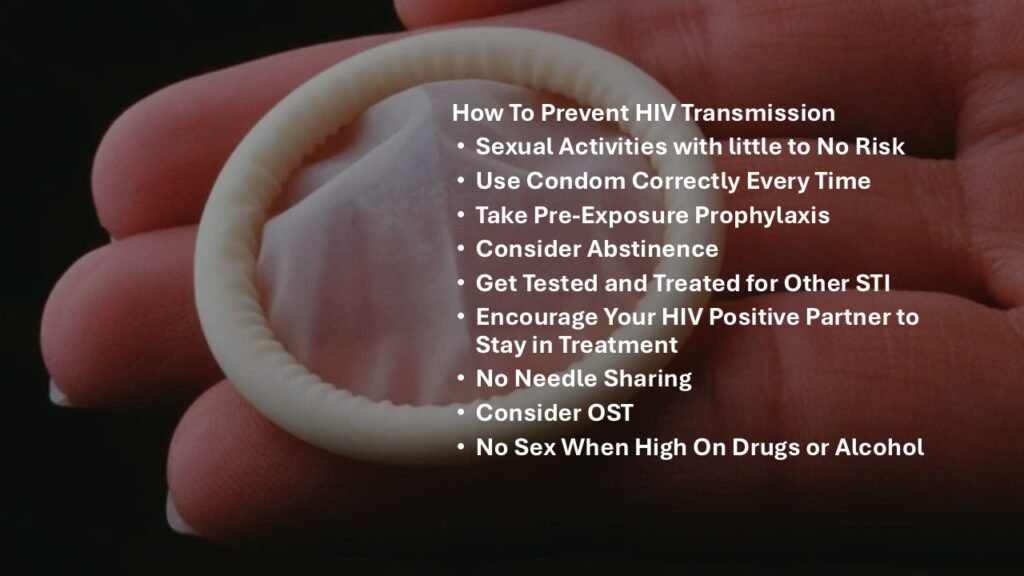Introduction
Preventing HIV transmission is crucial for maintaining your health and the health of others. By understanding and practicing safer behaviors, you can significantly reduce the risk and prevent HIV transmission. So, here’s a guide on how to prevent HIV transmission through sexual activities and injection drug use.

Safe Sexual Practices To Prevent HIV Transmission
Engaging in safer sexual activities and using protection effectively can greatly reduce the risk of HIV transmission. Here are some steps you can take to prevent HIV transmission through sex:
1. Choose Sexual Activities with Little to No Risk
- Opt for sexual activities that have a lower risk of HIV transmission, such as oral sex, rather than anal or vaginal sex. The risk of getting HIV from oral sex is extremely low.
- You cannot contract HIV from sexual activities that do not involve the exchange of bodily fluids like semen, vaginal fluids, or blood. Activities such as kissing or mutual masturbation are considered safe and can help prevent HIV transmission.
2. Use Condoms Correctly Every Time
- Condoms are highly effective in preventing HIV transmission and other sexually transmitted infections (STIs) like syphilis, gonorrhea, and chlamydia. Make sure to use them correctly every time you have sex.
- Use water-based or silicone-based lubricants with condoms to reduce the chances of them breaking or slipping during intercourse. Avoid oil-based lubricants, as they can weaken condoms and increase the risk of them tearing, compromising your efforts to prevent HIV transmission.
3. Take PrEP (Pre-Exposure Prophylaxis)
- PrEP is a daily medication for people at high risk of HIV that can significantly lower their chances of getting infected. When taken consistently and as prescribed, PrEP is highly effective in preventing HIV transmission from sex.
- It’s important to adhere to the PrEP regimen as prescribed by a healthcare provider. If not taken correctly, PrEP becomes less effective at preventing HIV transmission.
4. Consider Abstinence
- Choosing not to have sex (abstinence) is the only 100% effective way to prevent HIV transmission through sexual contact.
- People might choose abstinence at different times in their lives for various reasons, such as personal, health, or relationship considerations. Abstinence also prevents other STIs and unwanted pregnancies, making it a reliable way to prevent HIV transmission.
5. Get Tested and Treated for Other STIs
- If you have an STI, you’re at a higher risk of contracting HIV. Getting regularly tested and treated for STIs can lower your chances of HIV infection and help prevent HIV transmission.
- Many STIs do not show symptoms, so regular testing is important even if you feel healthy. Early detection and treatment can prevent complications and reduce the risk of spreading STIs to others, thereby helping to prevent HIV transmission.
6. Encourage Your HIV-Positive Partner to Stay in Treatment
- If your partner is living with HIV, one of the best ways to prevent HIV transmission is for them to stay on HIV medication and maintain an undetectable viral load. This means the amount of HIV in their blood is so low that it cannot be detected by standard tests.
- When your partner consistently takes HIV medication and achieves an undetectable viral load, there is effectively no risk of transmitting HIV to you through sex. This is a crucial step to prevent HIV transmission in a relationship.
How To Prevent HIV Transmission from Injection Drug Use
Preventing HIV transmission is also important for individuals who use injection drugs. Here are some key practices to prevent HIV transmission in this context:
1. Never Share Needles or Injection Equipment
- Always use new, clean syringes and injection equipment every time you inject drugs. Sharing needles increases the risk of HIV and other bloodborne infections, so using new equipment is essential to prevent HIV transmission.
- Many pharmacies and community health centers offer needles and syringes without a prescription to reduce the risk of HIV transmission.
2. Take PrEP
- PrEP isn’t just for preventing HIV through sex; it’s also effective for people who inject drugs. Taking PrEP as prescribed by a healthcare provider can greatly reduce the risk of contracting HIV, helping to prevent HIV transmission from injection drug use.
- As with sexual transmission, adherence to the medication schedule is crucial for PrEP to be effective in preventing HIV transmission.
3. Avoid Sexual Activity When High on Drugs or Alcohol
- Being under the influence of drugs or alcohol can impair judgment and lead to risky sexual behaviors, such as unprotected sex. This increases the risk of HIV transmission.
- If you are going to have sex while under the influence, ensure you use condoms correctly to protect yourself and your partner and prevent HIV transmission.
4. If You Must Share Needles, Clean Them with Bleach
- While it’s always best to use new, sterile syringes, if you must share, cleaning them with bleach can significantly reduce the risk of HIV and hepatitis. This practice is a way to reduce, but not completely prevent, HIV transmission.
- Disinfecting with bleach is not as effective as using new syringes but is better than not cleaning them at all.
5. Consider Not Injecting Drugs
- The most effective way to prevent HIV transmission through injection drug use is to avoid injecting altogether. Seek support from healthcare providers, counselors, or support groups to explore treatment options for substance use, such as Oral Substitution Therapy (OST), which can help reduce dependency on injection drugs.
Conclusion
To prevent HIV transmission, it’s important to use a combination of strategies, including safe sexual practices, the proper use of protection, taking medication, and avoiding risky behaviors. Furthermore, by staying informed and taking proactive steps, you can protect yourself and others from HIV. If you have any questions or need support, always consult with a healthcare provider for personalized advice and resources on how to effectively prevent HIV transmission.
